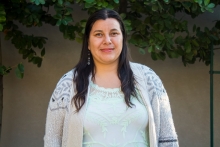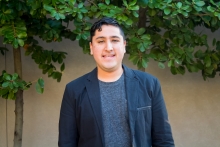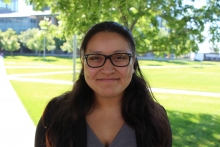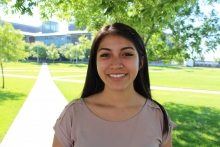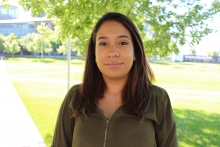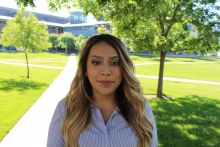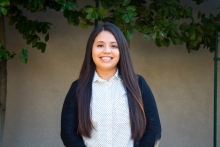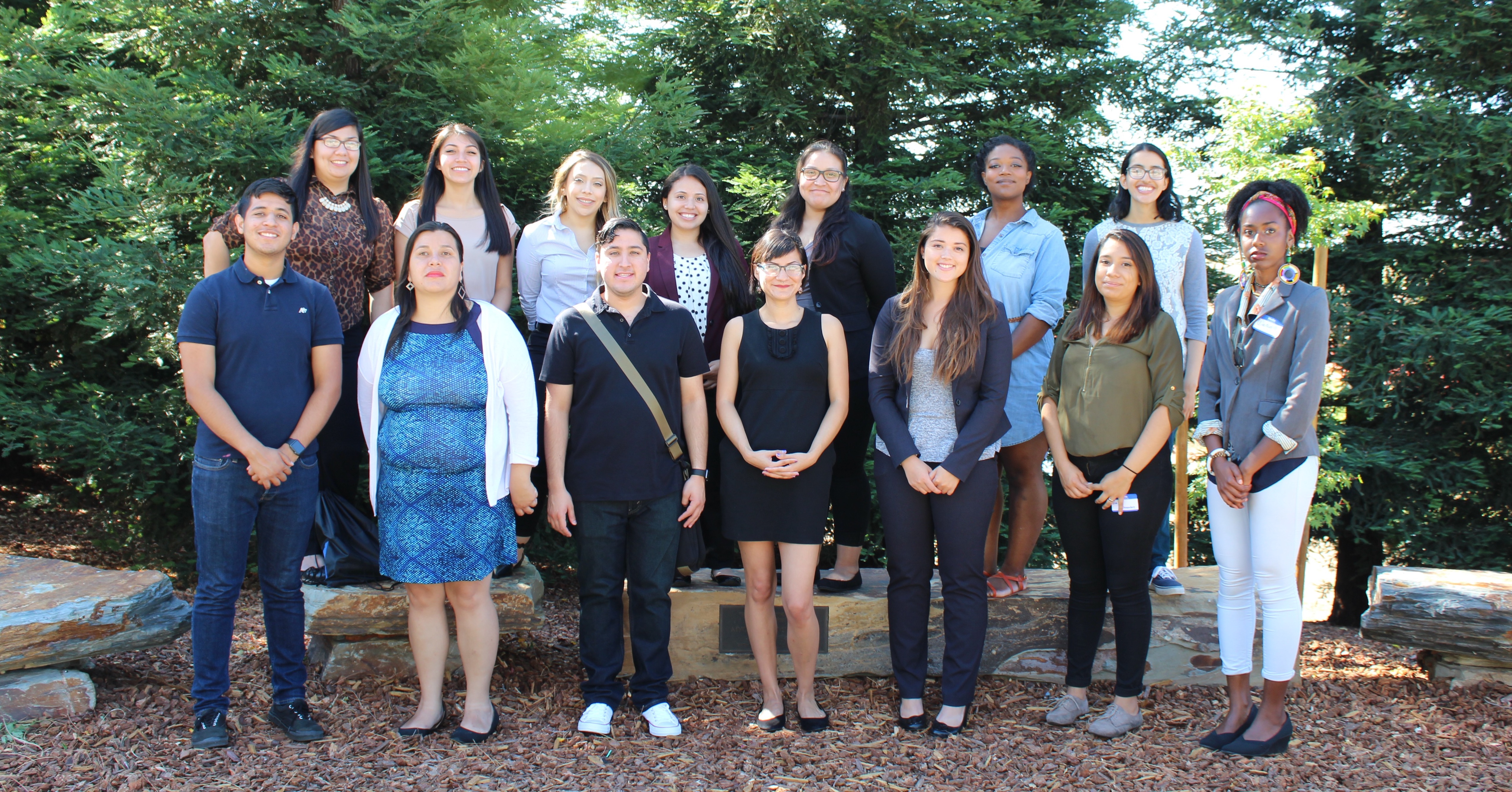Nancy Aguilar
First and foremost, Nancy wants to get her BA in Psychology from UC Merced, then move on to graduate school. To obtain these goals, she is involved in activities that will help her learn more about her field, works arduously in all her courses, and enjoys the overall journey. The profound life changing experience for Nancy was becoming a parent, because her children have shown her unconditional acceptance and are such a motivational force for her.
Lyrical Expression of Shame
Nancy Aguilar and Jayson Beaster-Jones, PhD; School of Social Sciences, Humanities, and Arts, University of California, Merced
Shame is a state of being or feeling dishonored, or humiliated. The experience of shame is increased among one’s person or close social network. Often times, a country music artist uses lyrical expression as a mode to establish their authenticity, and through song convey relatable emotion, such as shame. The aim of this research is to explore how shame is expressed in country music, in particular when shame and romantic relationships are lyrically expressed in country music songs. I will contextually analyze Kitty Wells, “It Wasn’t God Who Made Honky tonk Angels” (1952); Kenny Rogers, “Ruby, Don’t Take Your Love to Town” (1969); Charley Pride, “Why Baby Why” (1983); Carrie Underwood, “Before He Cheats” (2005). In this presentation, I will analyze how these artists manage to establish their authenticity within this genre and a brief history of country music development will be discussed. I will show the link between lyrically expressed shame in country music, and humiliation within romantic relationships. Thus, further exploration with this relationship and an artist’s authenticity needs to be assessed to better understand the continued success of country music.
Matthew Alvarez
Matthew Alvarez is a fourth-year undergraduate student at the University of California, Merced. He is expected to graduate in the Spring of 2018 with a Bachelor of Arts degree in Psychology including a minor in Sociology. In 2015, he received the Academic Excellence award for achieving the Chancellor's Honor list. At UC Merced, Matthew has already contributed to the academic arena by publishing a piece titled "Weight Discrimination: Beliefs and Stereotypes Regarding Race and Health" in the UC Merced Undergraduate Research Journal in the Fall of 2016. Most importantly, Matthew is an agent for progressive social change by being involved and giving back to his community. He is currently a member and scholar of the Fiat Lux Program where he takes pride in being a first-generation college student. He is an activist for social justice and inspires to be a voice for the most marginalized and vulnerable populations in society. On his free time you can find Matthew volunteering for organizations in the Central Valley, going to the movie theater, looking for a book in a library or bookstore, baking with his mother, and spending time with family and friends. His ultimate ambition is to receive a PhD in Psychology and to open his own rehabilitation center providing mental health services and substance abuse counseling in disadvantaged and low-income communities.
How Advertisements are Made Political and Provoke Emotion
Matthew Alvarez and Jayson Beaster-Jones, PhD; School of Social Sciences, Humanities, Arts, University of California, Merced
Past scholars, particularly in psychology, have focused on music’s power to elicit emotions. More specifically, the literature has emphasized a common framework on how musical elements in motion picture and advertising commercials provoke a variety of emotions, particularly nostalgia and fear. There has been a lack of an interdisciplinary approach in examining how the various elements provoke emotion, especially in political commercials. In order to address this question of emotion in advertising, I conducted content analysis on three politically-oriented commercials. I will argue that music was just one important part of the many interdisciplinary elements that make advertising politically and emotionally provoking. My analysis of politically-oriented advertising relies upon integrated theory combining humanistic perspectives within sociology, psychology, ethnomusicology, visual art, literature, and history. My research examines the depiction and symbolism of important social movements and the representation of race, the incorporation of gospel music to denote Black cultural experiences, the use of black and white imagery to signify historical time periods, the integration of poetic rhetoric such as metaphor and repetition through lyrical voice narration, and the focus on human faces and speech to create a realistic political portrait and intimate space for the viewer. Thus, I argue that political advertising blends all these elements together to form, persuade, and pitch a cohesive political message and to sell both their brand, and a particular political ideology.
Verenize Arceo
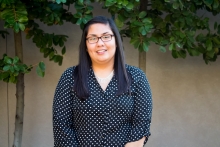 |
Major: History
Home City: Winton, CA
Contact: varceo@ucmerced.edu
Faculty Mentor: David Torres-Rouff
|
Verenize Arceo is a third-year undergraduate student majoring in History and minoring in Political Science. She expects to graduate from the University of California, Merced in Spring 2018. Verenize is interested in asking questions concerning racial, social, and gendered divides in American cities. She intends to focus her research on the Merced area as well as the surrounding small towns. Verenize is currently a student intern for the Center of Engaged Teaching and Learning's SATAL Program at UC Merced. She goes into classrooms on campus and helps obtain the students' perspective on what is working and not working in the classroom in an effort to enhance the overall learning environment. In her free time, Verenize enjoys baking and spending time with her family.
Verenize Arceo and David Torres-Rouff, PhD; School of Social Sciences, Humanities, and Arts, University of California, Merced
Stereotypes enforced by European Americans, with strong social and political capital, largely influenced the presence of Chinese residents in Merced County’s history in the late 1800s. European Americans often held beliefs that Chinese residents did not contribute to the formation of Merced County. By examining Merced County’s census records, county tax assessment rolls, and grantee records from 1866 to 1884, these archival documents reveal that Chinese residents were acquiring and expanding county spatial boundaries; ultimately, increasing their presence in the area. This growing visibility, as seen in the formation of Chinatowns in Snelling and Merced, has not been thoroughly recognized by scholars; thus, leaving a void in the history of Chinese residents in the Central Valley. Preliminary research seeks to fill these gaps and add to growing scholarship centered on Chinese residents in California. Continued research will seek to construct maps that tie Chinese residents to spatial boundaries in Merced County to adequately demonstrate the physical presence and power Chinese residents had in the area through financial and land capital. Furthermore, this project demonstrates Merced County’s role in a larger national narrative concerning the neglect of minority history, as part of a greater history of the United States.
TaNayiah Bryels
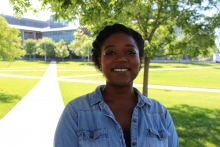 |
Major: English
Home City: Santa Clara, CA
Contact: tbryels@ucmerced.edu
Faculty Mentor: Katherine Brokaw
|
TaNayiah is a third year English major at UC Merced. TaNayiah is active in the small but strong English major community, and in the amazing arts scene of Merced at large. When not pursuing her BA or her research, she enjoys performing in plays and musicals, working with children, and taking naps. She is still working on her life goals, but education and literature are her driving forces, as well as, music, critical race studies, french, and so much more.
Teach the Child: Children, Shakespeare, and Empathy
TaNayiah Bryels and Katherine S. Brokaw, PhD; School of Social Sciences, Humanities, and Arts, University of California, Merced
This study looks into the effects of an early introduction to Shakespeare in various capacities on grade school children, and how it affects their development of empathy and interactions with fellow children. I argue that introducing students to diverse and modernized Shakespeare, in a hands-on and straightforward fashion (instead of traditional and more alienating way) increases understanding in children, helping marginalized children develop higher self-esteem, and helping non-marginalized students develop empathy and deeper understanding for their classmates. Research for this was largely hands-on; interviews were conducted with Shakespeare actors across California, and small workshops were conducted with groups of child actors in Merced. Some book research was also conducted, to analyze methods of modernizing Shakespeare, and place the argument in the larger context of the world of Shakespearean criticism. Preliminary findings support the argument, and prove that children not only favor more modernized Shakespeare performances that reflect their community, but enjoy the opportunity to dig into those performances, and benefit emotionally from both seeing and participating in local Shakespeare that favors diversity and creativity over traditionalism. Children are benefitted by seeing themselves and their diverse peers reflected in Shakespearean theatre, one of the most highly respected art forms of our day.
Sergio Cabrales
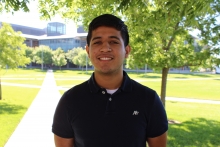 |
Major: Public Health
Home City: Huntington Park, CA
Contact: scabrales@ucmerced.edu
Faculty Mentor: Jayson Beaster-Jones
|
Sergio Cabrales is a second-year student at the University of California, Merced. His expected graduation date is Spring 2019 with a BA in Public Health. As a current student, Sergio works in the Fiat Lux Scholar Program where he assists first generation students to achieve academic success. His love for music and guitar allowed Sergio to create and become president of the first guitar club at UC Merced known as Jam Central. Sergio's biggest life accomplishment was being the first person in his family to graduate high school and attend a University. As a first-generation student, Sergio's short-term goal is to graduate from the University of California, Merced with experience to help guide in his future career as a Public Health nurse. As a strong advocate for higher education, his long-term goal is to join a position in LAUSD district board members and emphasize college centers in every high school.
Music Therapy and Alzheimer's Health: Focusing on the Environmental Factors
Sergio Cabrales and Jayson Beaster-Jones, PhD; Global Arts Studies Program, School of Social Sciences, Humanities, and Arts, University of California, Merced
Music Therapy is not just a resource that provides socializing and entertainment for elderly in nursing homes, it is a health intervention that uses music as an element to address, maintain, and promote emotional, social, and cognitive needs of individuals. Music therapy is one way to improve Alzheimer’s patient’s quality of life, including their physical, mental, and social health. The benefits music therapy with Alzheimer’s patients are well known to researchers, but many studies don’t emphasize the environmental issues affecting the quality of life of Alzheimer’s patients. These issues include nursing training, medical practice, lack of family involvement, and nursing home environment. In this presentation, I argue that quality of life among Alzheimer’s patients in nursing homes are negatively affected by the environment of long-term care. By using music therapy as an intervention in nursing homes, I suggest that overall quality of life will be improved. By closely conducting a literature review, this project will bring vital recognition on the importance of music therapy to help reduce environments negative effects on Alzheimer’s patient’s quality of life.
Jessica Calderon
Jessica Calderon is a third-year undergraduate student from Bakersfield, CA. Expected to graduate in Spring 2018 with a BA in Anthropology. Jessica has already begun to make her mark at the University of California, Merced by previously assisting professors on their research and now conducting her own independent research. Jessica has also been an active member in her community as an officer of ACUCM and a member of the Anthropology Society. She thinks it is important to give back to her community by volunteering her time, knowledge, and influence in communities where she believes she can contribute and make a difference. To destress, Jessica finds herself stargazing alone and spending time with her mother and father and her twelve siblings. She aspires to achieve a PhD in Physical Anthropology, and her goal is to inspire First Generation Students from similar backgrounds to pursue higher education.
What is "First Generation"? Defining and Identifying the Term "First-Generation" among First-Generation College Students in Higher Education
Jessica M. Calderon and Anneeth K. Hurdle, PhD; School of Social Sciences, Humanities, and Arts, University of California, Merced
The topic of First- Generation in Higher Education has been a topic widely researched in several academic disciplines e.g. Psychology, Sociology, and Anthropology etc. Research done varies in social, academic, and financial disadvantages to cognitive, psychological and educational preparedness. Although there has been research done in numerous topics of “First- Generation”, there is very little research done in what identifies a “First- Generation” college student and how it is defined as in a system of Higher Education. Preliminary research indicate that there is a vague set of identifications that are used to identify what a “First- Generation” college student is, however; the way the term is defined varies completely. This project will addresses the issue that in systems of Higher Education there is no clear understanding as to what defines and identifies a “First- Generation” college student and it will also address the issues that programs that were created to assist “First- Generation” college students have to face due to this unclear term. I argue that further research will indicate that programs that were created to assist First- Generation college student face difficulties when trying to properly assist and identify First-Generation college students and First- Generation students face difficulties in their academic and social complexity due to the lack of a solid sense of institutional identity within the community.
Leslie Gonzalez
Leslie Gonzalez is a third year undergraduate student from Downey, CA. She is expected to graduate in December 2018 with a BA in Economics. Leslie plans to attain her Bachelor's Degree in three and a half years, then obtain a PhD in Economics. Since she believes it is important to help others be successful, she tutors student athletes in a variety of Math and Economics courses. As hobbies, Leslie likes swimming and cheerleading. She is currently on the UC Merced Cheer team. She finds that exercising helps her deal with the stress associated with school work.
Forgotten Stories: Chinese Immigrants in Merced County from 1885-1990
Leslie Gonzalez and David Torres-Rouff, PhD; School of Social Sciences, Humanities, and Arts, University of California, Merced
Chinese Americans in the Central Valley during the second half of the 19th Century were misrepresented by European Americans who had higher social and class standing. Chinese immigrants were forced to live in unsuitable living conditions, and thus were seen in the same light as their surroundings. Remaining objects rather than subjects, Chinese immigrants during that time were forced to negotiate with the social identity given to them by the European Americans. Looking through Merced County Assessment Tax Records, Grantee Records, and Census Records from 1850-1900, I examine how Chinese immigrants created communities amongst themselves and the relationship between their social identity and their communities. I consider factors on the lives of Chinese immigrants such as their economic success, property accumulation, and the spatial organization of Chinese American communities overtime in Merced County. Analyzing the information gathered from official records will offer a solution to the lack of evidence about Chinese Americans in the history of the Central Valley.
Eva Hernandez
Eva Hernandez is a third year undergraduate student from Modesto, California. She is expected to graduate fall of 2018 with a BA in Sociology. She is currently working under Dr. Tanya Golash-Boza on a research project and hopes to continue working on this project in the fall. Because of her rearing in an underprivileged neighborhood, she wishes to continue doing research in policies and crime in hopes of developing policies that are successful at comating the source of crime. Eva thinks it is important to always bear in mind where one came from and hopes to go back and help uplift her community. She aspires to achieve a JD and her ultimate goal is to change the way people view crime.
History of War on Drugs in Washington DC
Eva Hernandez and Tanya Golash-Boza, PhD; School of Social Sciences, Humanities, and Arts, University of California, Merced
This research project explores at the factors that led to mass incarceration in Washington DC and the effects of incarceration on the city from 1985 to 2000. I am working on tracking several court cases and newspaper articles in that time period related to drug offenses and drug gangs in order to create a narrative, that provides an insight to laws and policies used that led to an increase of incarceration. A key area of focus will be Racketeer Influenced and Corrupt Organization (RICO) and similar laws due to their application on street crews and gangs starting in 1992. We expect to find that the introduction of RICO and similar laws increase sentencing time among those incarcerated ultimately affecting incarceration rates and the city. This preliminary research will be paired with interviews, content analysis of city budgets, and agreements with federal agencies in order to go more in depth into identifying factors leading to the increase of incarceration rates. Through the use of census data combined with visual representation of the city from three different time periods such as 1990, 2000, and 2010, we expect to see a change in the general layout of the city in correlation with arrest rates and arrest locations. In conclusion, the project seeks to identify factors that led to an increase of incarceration rates in Washington DC while looking at how the city changed in relation to the increase.
Yuliana Hernandez-Mora
Yuliana Hernandez-Mora is a third-year undergraduate student from Merced, CA. Expected to graduate in Spring 2019 with a BA in Spanish, Yuliana already has two Associate degrees under her belt in International Studies and Sociology & Social Sciences from the local community college, Merced College, in honors standing. As a Merced native, Yuliana understands the importance of improving her own community which was ultimately the reason for her attending UC Merced as she feels being educated in the same small town she was born in allows her to bear witness to the areas where improvement is most needed and then, be the improvement she wishes to see. She became a volunteer interpreter for the KIND (Kids in Need of Defense) organization which represents unaccompanied immigrant and refugee children in their deportation proceedings where volunteers like Yuliana interpret for the lawyers and allow the children's voices to be heard. She aspires to help lessen the various linguistic and cultural disparities for Hispanic individuals like her parents as they accumulate into American culture and be an example for generations to come.
Language, Cultural, and Service Disparities Within Health Narratives of Primarily Spanish Speaking Individuals in Merced County
Yuliana Hernandez-Mora and Dalia Magana, PhD; School of Social Sciences, Humanities, and Arts, University of California, Merced
About 49.6 percent of the current 80,608 population of Merced, California is of Hispanic or Latino race and ethnic origin (Brown University 2010). Naturally this leads to the Spanish language representing over 34 percent of the languages spoken in all households in the city of Merced over time (Statistical Atlas 2015). Despite the prevalence of the Spanish language in Merced County, there exists various linguistic barriers that are emphasized in medical settings where Hispanic individuals with limited English proficiency must depend on non-Spanish speaking physicians and professionals for medical treatment. Although language differences appear to be the greatest and most obvious of barriers present, there also exists broader disparities culturally as well as binationally as the current participant pool of eighteen individuals suggests a larger presence of those who are of Mexican origin. Considering the two countries share a boarder, it is no surprise many have immigrated and will continue to do so, bringing along the according set of cultural ideals and expectations of their native country with them and then expect to apply them here. By interviewing these Spanish speakers in a semi-structured form, I allow for a more natural conversation to take place which in turn, can greater reveal the severity and consequences of such barriers in medical settings. These interviews have allowed individuals with low English proficiency an alternative voice to share their struggles in these settings without fear of repercussion or other dire consequences such as fear of deportation. Within the participants’ answers, there are various contributing factors such as how long an individual has been in the country after immigrating, the presence and efficiency of medical staff, including interpreters, as well their expectations of medicinal practices that have illustrated a commonality with most, if not all, of these participants. Although these findings are preliminary, this study seeks to further uncover, within their health narratives, their true sentiments, ambiguities and even hostilities that can arise in these encounters, and, in return, offers the perspective of patients who are non-native English speakers, one we have not truly recognized in the past. By discovering when and why these instances of linguistic, cultural, and binational disparities most often occur, these implications can serve to offer possible suggestions on how to lessen these disparities so that future health care can be improved for this kind of prominent individual in American society.
Daria Imbukwa
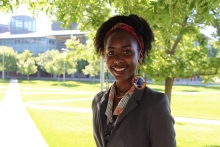 |
Major: Public Health
Home City: Nairobi, Kenya
Contact: dimbukwa@ucmerced.edu
Faculty Mentor: Jayson Beaster-Jones
|
Daria Imbukwa is a third-year undergraduate student at the University of California, Merced. She enjoys being involved in school and community activities and will be involved in ASUCM student body 2017-2018 Academic year. Daria studies Public Health and hopes to build a school and hospital in her homeland of Western Kenya and leadership training centers for the youth. Her hobbies are music, writing and spending time with family.
The Relationship of Music and Autobiographical Memory Within the Kenyan Diaspora Living in the SF/Bay Area
Daria Imbukwa and Jayson Beaster-Jones, PhD; Global Arts Study Program, School of Social Sciences, Humanities, and Arts, University of California, Merced
The question of whether or not music shapes the memory of an individual is widely debated within the field where music and science meet, with scholars such as Carlos Silva Pereira, How Music Affects the Brain, and Jennifer Lynn Stubing, Music, Mood, and Memory: An In-Depth Look at How Music Can be Used as a Trigger to Elicit SPecific Emotional Responses and Associated Memories, arguing that music shapes the mood and memory of an individual. Also, that music can be utilized as a trigger tool, to evoke emotional responses. However, these articles have not adequately addressed the issue of how music can be used as a mean of healing or how music shapes the autobiographical memory. There need to be more in-depth details about those two focuses. My paper addresses the issue of how music can create a triggering response within a person’s brain, and how it can be used as a tool of healing the individual mentally or emotionally. Also, it addresses the relationship between music and autobiographical memory with the Kenyan DIaspora in SF/Bay Area. Specifically, in my project, I will be looking at Kenyan music and the Kenyan diaspora in SF/Bay Area, in order to show how the music of Kenya has shaped the people of Kenya in the age range of 30 and above. I will discuss autobiographical memory, triggers, and Kenyan music, and juxtapose against the misconceptions of music and memory, in order to reveal the previously misunderstood connections between music and autobiographical memory. I argue that Kenyan music has shaped the autobiographical memory of the Kenyan diaspora, living in the SF/Bay area, aged 30 and above. In conclusion, this project, by closely examining the relationship between music and autobiographical memory within the Kenyan diaspora in the SF/Bay area, sheds new light on the rarely acknowledged issue of memory loss, mental illnesses/cognitive illnesses and brain damage.
Santana Juache
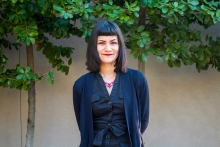 |
Major: Anthropology
Home City: Stockton, CA
Contact: sjuache@ucmerced.edu
Faculty Mentor: Anneeth Kaur-Hurdle
|
Santana Juache is a third year undergraduate student from Stockton, CA. She is expected to graduate in Spring 2018. She's done archaeological research analyzing Native American artifacts from Yosemite National Park, with a professor who works in that area. She is now ready to embark on her own research project as a socio/cultural anthropologist. As a female student of color, she is interested in helping those from similar backgrounds. Having already done volunteer work with the Western Farm Workers Association, she is determined to help those who are underrepresented to find their voice and make changes in the world. She would like to hear what others have to say and write books about their experiences, trying to unmask social justice and contribute to theories, or to create her own. As a student, mother, and activist, Santana is already headed in the right direction to make contributions to her community. After a long day of research or volunteer work, Santana enjoys going to art exhibits, visiting museums, going for hikes, and attending rock concerts.
Barriers and Dynamics of Firs-Generation Transfer Students at UC Merced
Santana Juache and Anneeth Kaur-Hundle, PhD; Department of Anthropology, School of Social Sciences, Humanities, and Arts, University of California, Merced
The question of whether or not music shapes the memory of an individual is widely debated within the field where music and science meet, with scholars such as Carlos Silva Pereira, How Music Affects the Brain, and Jennifer Lynn Stubing, Music, Mood, and Memory: An In-Depth Look at How Music Can be Used as a Trigger to Elicit SPecific Emotional Responses and Associated Memories, arguing that music shapes the mood and memory of an individual. Also, that music can be utilized as a trigger tool, to evoke emotional responses. However, these articles have not adequately addressed the issue of how music can be used as a mean of healing or how music shapes the autobiographical memory. There need to be more in-depth details about those two focuses. My paper addresses the issue of how music can create a triggering response within a person’s brain, and how it can be used as a tool of healing the individual mentally or emotionally. Also, it addresses the relationship between music and autobiographical memory with the Kenyan DIaspora in SF/Bay Area. Specifically, in my project, I will be looking at Kenyan music and the Kenyan diaspora in SF/Bay Area, in order to show how the music of Kenya has shaped the people of Kenya in the age range of 30 and above. I will discuss autobiographical memory, triggers, and Kenyan music, and juxtapose against the misconceptions of music and memory, in order to reveal the previously misunderstood connections between music and autobiographical memory. I argue that Kenyan music has shaped the autobiographical memory of the Kenyan diaspora, living in the SF/Bay area, aged 30 and above. In conclusion, this project, by closely examining the relationship between music and autobiographical memory within the Kenyan diaspora in the SF/Bay area, sheds new light on the rarely acknowledged issue of memory loss, mental illnesses/cognitive illnesses and brain damage.
Alison Luna
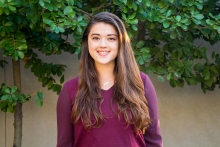 |
Major: Political Science
Home City: Belmont, CA
Contact: aluna38@ucmerced.edu
Faculty Mentor: Katherine Brokaw
|
Alison Luna is going into her second year as a political science major at the University of California, Merced. This is her first summer in the UROC-H program and she is excited to be working with Dr. Katie Brokaw on modern Shakespeare performance. In the future, Alison hopes to attend law school and hopefully pursue a joint JD-PhD program so that she can pursue her interest in both law and research.
Modern Shakespeare Audience, Shakespeare's Continued Relevance in Scholarship and Literature, as well as in Culture and Human Experience
Alison Luna and Katherine Brokaw, PhD; School of Social Sciences, Humanities, and Arts, University of California, Merced
How can Shakespeare be made relevant to a modern audience? Shakespeare wrote during the era of English Renaissance Theatre, between 1562 and 1642. Since then, theatre has changed in many ways, from subject matter to language to overall purpose. The times have changed, the audience has changed, and William Shakespeare himself is long dead, so why do people still care about his work, and how do they try to preserve it? My study aims to answer these questions through pointed observation and analysis of several productions of various Shakespeare plays across California. Each production had a different take on Shakespeare, and a different way of attempting to bring the audience in. My research concludes that theatre adapts to changing times and new audiences not only with the proliferation of new plays, but also reformation of old ones.
Maria Rivas Reyes
Maria Rivas is a second-year undergraduate student from Sacramento, CA. Expected to graduate in Spring 2019 with a BA in Public Health and a Minor in Spanish. Maria has been involved with several organizations including M.E.Ch.A de UC Merced and the Lift While You Lead Mentoring Network. Maria is a member of the Fiat Lux Scholars Program and a former Community Scholar for the program as well. Maria is a UROC-H scholar investigating narrative health with Spanish speaking individuals in the Central Valley. She is passionate about nutrition and public health education. One of Maria's goals is to become a certified Spanish interpreter so she may help Spanish speaking people to better understand their doctor's visits. During her free time, Maria enjoys jogging and taking trips to Yosemite. After graduation, Maria plans to pursue a career in public health.
First Generation Hispanic Immigrants in Merced County: Health Narratives and Actions Taken in Response to Health Care Barriers
Maria Rivas Reyes and Dalia Magana, PhD; School of Social Sciences, Humanities, and Arts, University of California, Merced
Merced County’s Spanish speaking population faces health care barriers at the singular and systematic levels. These barriers include transportation to medical facilities, high waiting times at medical offices, lack of interpretation services, lack of health insurance, limited coverage of health insurance, and high costs of health care services. They also encounter communication and cultural barriers. Although literature is replete with barriers Hispanic populations encounter in different rural settings, less often reported are the actions that first generation Hispanic immigrants take to aid their illnesses in response to facing said barriers. The current study collected health narratives from eighteen first generation Hispanic immigrants from Merced County. Congruent with previous research findings, the health narratives reported by participants revealed that they encountered at least one health care barrier. Almost consistently, the findings showed that first generation Hispanic immigrants turned to conventional medicine, used over the counter drugs, tended to seek care only in urgent cases, and even went back to their home countries to find the medical care they couldn’t access in their cities. These findings may continue to help us understand how the Spanish population of Merced County understands the barriers that stand in their way from medical care.
Akhila Yechuri
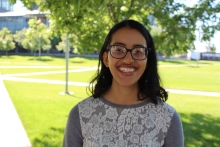 |
Major: Public Health
Home City: Pleasanton, CA
Contact: ayechuri@ucmerced.edu
Faculty Mentor: Marielena Gonzalez
|
Akhila Yechuri is a second year undergraduate at UC Merced from Pleasanton, CA. She is majoring in Public Health. Expected to graduate in Spring 2019, Akhila aspires to receive a Master's in Public Health or get a law degree. Her goals are to earn an increased amount of research experience and learn more about graduate school, and hopes that UROC can help her with these goals. Akhila is also a Strauss scholar, as well as an active member of the UC Merced community. She serves on student government, and is a mentor for high school girls. In her spare time, she enjoys reading fiction, singing, and spending time outdoors.
A Qualitative Analysis of Health Survey Marginalia
Akhila Yechuri and Mariaelena Gonzalez, PhD; School of Social Sciences, Humanities, and Arts; University of California, Merced
Consistent oral hygiene habits are paramount for the efforts to preserve our overall health. This study analyzes marginalia in oral health surveys by examining survey responses to observe overall trends and barriers to dental care access. Items in surveys frequently receive elaboration and other complex answers from respondents; however, any nonadherence to survey format is nearly always excluded from the collected data. These additions and qualifications often convey responses outside the expectations of the survey (McClelland [American Psychological Association, 2, (2016)]). An insufficient amount of research regarding marginalia in conducting surveys has occurred; and the literature in this area is sparse. The overall purpose of this study is to examine oral health beliefs, knowledge, attitudes, practices and access to care through the analysis of marginalia in conducted surveys. I do so, through a codebook I developed, through which I analyze and expound upon significant trends and patterns in the 300 surveys that I examined. Preliminary data so far shows that English speakers and women are far more likely to display nonadherence to survey format. Overall, this analysis highlights lingual and social disparities in the way studies are conducted, specifically in the case of self-administered surveys. Examining these processes of marginalia is important to consider for future studies regarding survey administration. My analysis will contribute to the betterment of academia in public health and data collection.
